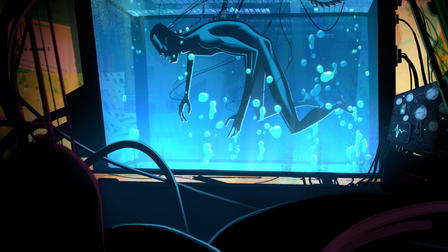In the span of a month I’ll have been to Washington DC, Guelph, Atlanta, and Edmonton. I’m half-way through what I’m jokingly referring to as my “Spring Speaking Tour.” Both my rats and my students might forget what I look like. This post is less of a blog and more about what-I’ve-been-up-to.
Mostly I’ve been thinking about Arendt and science fiction, both separately and together. I wrote about these two together in the first entry to this blog, focusing on the task of philosophy as Arendt describes the launch of the Sputnik satellite.
“Non-respectable” literature . . .
What I didn’t write about in that post was Arendt’s disparaging remarks about science fiction. She notes that the excitement for space travel and the sentiment that the Earth would not house humanity forever wasn’t new. Rather:
What is new is only that one of the country’s most respectable newspapers finally brought to its front page what up to then had been buried in the highly non-respectable literature [sic!] of science fiction (to which, unfortunately, nobody has yet paid the attention it deserves as a vehicle of mass sentiments and mass desires). (Human Condition, p. 2)
This quotation always makes me laugh, maybe more so now because I returned a week from the NeMLA annual conference, where I was participating in a seminar on using speculative fiction to teach social justice. I learned a lot from my fellow panelists, and also attended quite a few sessions dealing about the intersections of teaching politics and sci fi. My own paper was about using speculative fiction in teaching introductory gender studies courses and cultivating an awareness of what José Medina describes as “epistemic insensitivities” in the Epistemology of Resistance.
I’ve come home with ideas about using postcolonial science fiction and Afrofuturisms in GSJ 102: Introduction to Gender & Social Justice in the Global South next year. Here’s to the non-respectable!
. . . helping me think about labour, work, and action in Arendt . . .
I also got to visit a friend over the weekend, who showed me some episodes of the Netflix animated anthology show Love, Death & Robots. One episode has really stuck with me: “Zima Blue.” If you’re interested in Arendt on the place of art in public life, the joy of labour, and the relation between labor, work, and action, then this is the episode for you! And it’s only 10 minutes!
The episode is adapted from a short story by Alastair Reynolds.
. . . and Hope.
I’m also reading Letters to Star Trek, on the recommendation of the Women at Warp bookclub. Published in 1977, it’s a delightful (though perhaps a bit worship-full) collection of fan mail compiled and edited by Susan Sackett, Gene Roddenberry’s former assistant. A sense of hope and optimism comes through many of the letters (they are fan mail, after all) for the capacity of human beings to make the world a better home for everyone.
There are also good examples of people pushing against the sexism of the show. I’m not buying all Roddenberry’s explanations.
I’ve mentioned before Star Trek‘s influence on me as a philosopher. But it just struck me reading this book that my love of Star Trek and my admiration for Arendt’s philosophy share a similar orbit around a sense of hopefulness–and responsibility–for the future.
More philosophy and less personal news next time. Peace and long life.
Feature photo
A still from “Zima Blue,” courtesy of Netflix.
